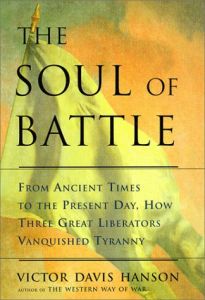Join getAbstract to access the summary!

Join getAbstract to access the summary!
Victor Davis Hanson
The Soul of Battle
From Ancient Times to the Present Day, How Three Great Liberators Vanquished Tyranny
Free Press, 1999
What's inside?
Is God on the side of the strongest artillery, or the strongest ideals? Three historic generals show how democratic principles make armies stronger, as souls and as soldiers.
Recommendation
While Napoleon declared that God favors the side with the most battalions, author Victor Davis Hanson suggests otherwise. Hanson reasons that the side marching to preserve a great moral cause - e.g., the defense of individual freedoms against the agents of human oppression - possesses the true soul of battle. Seen in this light, war becomes far more than a duel of logistics, technology and strategy. Hanson believes that victory’s first seeds are sown in the human spirit, and the terrible battlefield harvest is collected later. He provides three historic examples: Theban general Epaminondas’ destruction of Sparta, Union General William Sherman’s march through Georgia and U.S. General George Patton’s demolition of the Third Reich. In this well researched and almost poetically written volume, Hanson reveals the basis of democratic countries’ military dominance. getabstract.com recommends this book to military professionals, students of military history and those who seek a deeper understanding of the strength of democratic societies.
Summary
About the Author
The son of a U.S. Army Air Corps Sergeant who served under General LeMay in the devastating firebombing of Japan, author Victor Davis Hanson is a professor of classics at California State University in Fresno. He has written or edited several books, and is a frequent contributor to The New York Times, The Wall Street Journal and Military History Quarterly. He and his family live in Selma, California, on the family farm where he was born.

















Comment on this summary